![The Ealing Rarities Collection - Volume 1 [DVD]](/pictures/1121402.jpg) The Ealing Rarities Collection - Volume 1 | DVD | (08/04/2013)
from £N/A
| Saving you £N/A (N/A%)
| RRP
The Ealing Rarities Collection - Volume 1 | DVD | (08/04/2013)
from £N/A
| Saving you £N/A (N/A%)
| RRP A global byword for cinematic quality of a quintessentially British nature, Ealing Studios made more than 150 films over a three-decade period. A cherished and significant part of British film history, only selected films from both the Ealing and Associated Talking Pictures strands have previously been made available on home-video format - with some remaining unseen since their original theatrical release. The Ealing Studios Rarities Collection redresses this imbalance. Featuring new transfe...
![Night Mail [DVD]](/pictures/1092423.jpg) Night Mail | DVD | (16/02/2009)
from £11.57
| Saving you £1.42 (12.27%)
| RRP
Night Mail | DVD | (16/02/2009)
from £11.57
| Saving you £1.42 (12.27%)
| RRP Night Mail (1936) remains one of the most popular and instantly recognised films in British film history and was one of the most critically acclaimed films to be produced with the British documentary film movement. Night Mail is an account of the operation of the Royal mail train delivery service and shows the various stages and procedures of that operation. The film begins with a voiceover commentary describing how the mail is collected for transit. Then as the train proceeds along the course of its journey we are shown the various regional railway stations at which it collects and deposits mail. Inside the train the process of sorting takes place. As the train nears its destination there is a sequence - the best known in the film - in which Auden's spoken verse and Britten's music are combined over montage images of racing train wheels. Night Mail has been re-mastered and digitally restored and beautifully packaged in a clamshell box. Music by Benjamin Britten. Poetry by WH Auden.
![The Ealing Studios Rarities Collection - Volume 7 [DVD]](/pictures/1123899.jpg) The Ealing Studios Rarities Collection - Volume 7 | DVD | (14/10/2013)
from £8.77
| Saving you £6.22 (70.92%)
| RRP
The Ealing Studios Rarities Collection - Volume 7 | DVD | (14/10/2013)
from £8.77
| Saving you £6.22 (70.92%)
| RRP A global byword for cinematic quality of a quintessentially British nature, Ealing Studios made more than 150 films over a three decade period. A cherished and significant part of British film history, only selected films from both the Ealing and Associated Talking Pictures strands have previously been made available on home video format - with some remaining unseen since their original theatrical release. The Ealing Rarities Collection redresses this imbalance - featuring new transfers from...
![Foreman Went To France/Fiddlers Three [1942]](/pictures/1090187.jpg) Foreman Went To France/Fiddlers Three | DVD | (02/02/2009)
from £7.99
| Saving you £12.00 (150.19%)
| RRP
Foreman Went To France/Fiddlers Three | DVD | (02/02/2009)
from £7.99
| Saving you £12.00 (150.19%)
| RRP The Foreman Went To France / Fiddlers Three
![Target For Tonight [DVD]](/pictures/1133475.jpg) Target For Tonight | DVD | (25/08/2014)
from £N/A
| Saving you £N/A (N/A%)
| RRP
Target For Tonight | DVD | (25/08/2014)
from £N/A
| Saving you £N/A (N/A%)
| RRP Made by the Crown Film Unit for the RAF and widely regarded as one of the greatest British aviation films of the Second World War, Target for Tonight recreates an early Wellington bomber raid on Nazi Germany, concentrating on one aircraft in particular - F for Freddie. No actors were used. Instead genuine Wellington pilots and crew (including then Squadron Leader Charles Pickard) recreate the mission for the cameras. Scripted and directed by Harry Watt, the film went on to win an honorary Aca.
![Nine Men [DVD] [1943]](/pictures/1092667.jpg) Nine Men | DVD | (11/01/2010)
from £7.99
| Saving you £8.00 (100.13%)
| RRP
Nine Men | DVD | (11/01/2010)
from £7.99
| Saving you £8.00 (100.13%)
| RRP The North Africa campaign. When their lorry is destroyed by enemy aircraft nine soldiers are forced to make a stand in an abandoned desert hut against almost overwhelming Italian forces.
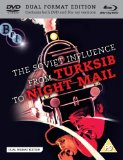 The Soviet Influence: From Turksib to Nightmail (DVD + Blu-ray) | Blu Ray | (19/09/2011)
from £19.20
| Saving you £2.05 (11.43%)
| RRP
The Soviet Influence: From Turksib to Nightmail (DVD + Blu-ray) | Blu Ray | (19/09/2011)
from £19.20
| Saving you £2.05 (11.43%)
| RRP The small number of Russian films which were shown in Britain in the late 1920s and early 1930s excited the attention of British filmmakers and writers, and played a central role in developing ideas about film as an art-form. In particular this influence was felt in the British documentary film work of such key figures as John Grierson and Paul Rotha.This unique and fascinating release explores this influence through the formal and thematic relationships between Viktor Turin's extraordinary, yet little-seen, silent documentary Turksib (1929), and a number of British documentary films, including the celebrated Night Mail (1936).
![The Overlanders [1946]](/pictures/1090192.jpg) The Overlanders | DVD | (26/01/2009)
from £11.99
| Saving you £4.00 (25.00%)
| RRP
The Overlanders | DVD | (26/01/2009)
from £11.99
| Saving you £4.00 (25.00%)
| RRP The Overlanders
![Where No Vultures Fly - Ealing [1951]](/pictures/1090208.jpg) Where No Vultures Fly - Ealing | DVD | (26/01/2009)
from £N/A
| Saving you £N/A (N/A%)
| RRP
Where No Vultures Fly - Ealing | DVD | (26/01/2009)
from £N/A
| Saving you £N/A (N/A%)
| RRP Where No Vultures Fly
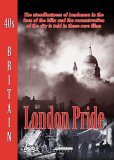 40's Britain - London Pride | DVD | (15/05/2006)
from £22.98
| Saving you £-2.99 (-15.00%)
| RRP
40's Britain - London Pride | DVD | (15/05/2006)
from £22.98
| Saving you £-2.99 (-15.00%)
| RRP A collection of rarely-seen films showing the effect of the blitz on London and its people and the plans for the post-war regeneration of the City. Includes: London Can Take It (1940): GPO Film Unit. Directors Harry Watt & Humphrey Jennings. This film about Londoners under seige during the blitz seen in the very rare American version was narrated by American journalist Quentin Reynolds. It was instrumental in persuading the USA to support Britain during World War II. The Proud City (1945): London County Council's plans for re-developing the city. Scored by William Alwyn. London Airport (1949): The construction of Heathrow Airport Moving Millions(1947): The post war changes in London Transport Journey On A London Bus (1950): Two African students sample the pleasures of travelling on London's buses which are always on time.
![Siege Of Pinchgut [DVD] [1960]](/pictures/1098019.jpg) Siege Of Pinchgut | DVD | (15/02/2010)
from £N/A
| Saving you £N/A (N/A%)
| RRP
Siege Of Pinchgut | DVD | (15/02/2010)
from £N/A
| Saving you £N/A (N/A%)
| RRP An escaped prisoner tries to clear his name.
![Target for Tonight [Collectors Edition]](/pictures/1073198.jpg) Target for Tonight | DVD | (09/07/2007)
from £19.97
| Saving you £-9.98 (N/A%)
| RRP
Target for Tonight | DVD | (09/07/2007)
from £19.97
| Saving you £-9.98 (N/A%)
| RRP Target For Tonight was made by the Crown Film Unit for the RAF and is widely regarded as one of the greatest British aviation films of the Second World War. Target For Tonight recreates an early Wellington bomber raid on Nazi Germany concentrating on one aircraft in particular - F For Freddie. No actors were used. Instead genuine Wellington pilots and crew recreate the mission for the cameras.
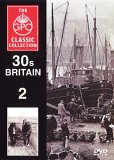 30's Britain Volume 2 - GPO Classic Collection | DVD | (31/07/2006)
from £25.35
| Saving you £-9.36 (-58.50%)
| RRP
30's Britain Volume 2 - GPO Classic Collection | DVD | (31/07/2006)
from £25.35
| Saving you £-9.36 (-58.50%)
| RRP The Saving Of Bill Blewitt (1937): directed by Harry Watt. How two fishermen save up to replace their wrecked boat. North Sea (1938): directed by Harry Watt. An Aberdeen trawler in trouble gets assistance from Wick coastguard radio station. The first successful example of the now familiar drama-documentary. The Islanders (1939): directed by Maurice Harvey. Life on the islands of Eriskay Guernsey and Inner Farne are linked to the mainland by the Post Office. A Midsummers Days Work (1939): About the laying of an 18-mile underground telephone cable in the Chilterns from Amersham to Aylesbury
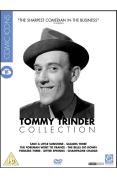 The Tommy Trinder Collection | DVD | (11/02/2008)
from £59.99
| Saving you £-25.00 (N/A%)
| RRP
The Tommy Trinder Collection | DVD | (11/02/2008)
from £59.99
| Saving you £-25.00 (N/A%)
| RRP Save a Little Sunshine (Dir. Norman Lee) (1938): In this musical comedy a man earns a reward and decides to spend some of it on restoring a ramshackle boarding house. Unfortunately his endeavor fails and he ends up working there to make ends meet. Later his ingenious girl friend saves the day by suggesting he turn the house into a fancy restaurant. Sailors Three (Dir. Walter Forde) (1940): Three British sailors find they've accidentally strayed on board a Nazi ship during WWII. They then proceed to take it over and requisition it for the Royal Navy. The Foreman Went To France (Dir. Charles Frend) (1942): Based on the true story of Melbourne Johns an aircraft factory foreman sent to France to prevent the Nazis getting hold of some vital equipment. Fiddlers Three (Dir. Harry Watt) (1944): A pair of Jolly Jack Tars on shore leave take a Wren (lady sailor) to Stonehenge and get caught in a time warp finishing up in ancient Rome. The Bells Go Down (Dir. Basil Dearden) (1943): Comedian Tommy Trinder plays it straight in this tribute to the wartime AFS (Auxiliary Fire Service). The dedicated band who kept the fires of London under control during the blitz and fire bombings of WWII. Bitter Springs (Dir. Ralph Smart) (1950): Tommy Trinder is called in to smooth things out when Wally King encroaches upon Aboriginal Tribal ground. Champagne Charlie (Dir. Alberto Cavalcanti) (1944): The story of a 19th century English music hall (vaudeville) performer and life behind the scenes.
![Night Mail / West Highland [1936]](/pictures/1042872.jpg) Night Mail / West Highland | DVD | (21/10/2002)
from £8.77
| Saving you £11.22 (127.94%)
| RRP
Night Mail / West Highland | DVD | (21/10/2002)
from £8.77
| Saving you £11.22 (127.94%)
| RRP Night Mail: The lasting appeal of Night Mail (1936) celebrating the Postal Special's run from London to Scotland is that it has all the attributes of the classic British documentary style established by John Grierson. Its realism and lyrical structure is perfectly complemented by W.H. Auden's verse and the music of Benjamin Britten. West Highland: By 1960 the reign of steam on Britain's most scenic railway the West Highland was drawing to its close. John Gray a BBC producer and sound engineer with the GPO Film Unit in the 1930s made West Highland as his tribute to this wonderful line.
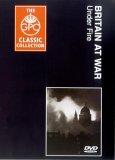 Britain At War - Under Fire | DVD | (14/11/2005)
from £25.90
| Saving you £-9.91 (-62.00%)
| RRP
Britain At War - Under Fire | DVD | (14/11/2005)
from £25.90
| Saving you £-9.91 (-62.00%)
| RRP Story Of An Air Communique (1940): with men of the Royal Air Force. Processing the figures for destoyed enemy aircraft. Britain Can Take It (1940): directed by Humphrey Jennings and Harry Watt. Presented by US journalist Quentin Reynolds. Used by President Roosevelt to help swing US opinion behind Britain. Britain At Bay (1940): commentary by J.B. Priestley. Czechoslovakia Poland Norway Holland and Belgium have fallen ... Men of the Lightship (1940): directed by David MacDougall. The Luftwaffe bombing of the East Dudgeon Lightship. Christmas Under Fire (1941): directed by Harry Watt. A Quentin Reynolds despatch from London to America showing Christmas in the Blitz.
![Night Mail & Lines For All Seasons [DVD] [1936]](/pictures/1128596.jpg) Night Mail & Lines For All Seasons | DVD | (01/12/2008)
from £9.61
| Saving you £10.38 (108.01%)
| RRP
Night Mail & Lines For All Seasons | DVD | (01/12/2008)
from £9.61
| Saving you £10.38 (108.01%)
| RRP United Kingdom released, PAL/Region 0 DVD: LANGUAGES: English ( Dolby Digital 2.0 ), SPECIAL FEATURES: Interactive Menu, Scene Access, SYNOPSIS: Shows the special train on which mail is sorted, dropped and collected on the run, and delivered in Scotland overnight. | ...Night Mail & A Line For All Seasons - Collection ( Night Mail / A Line For All Seasons / The Line To Skye / West Of Inverness )
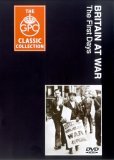 Britain At War - The First Days | DVD | (14/11/2005)
from £21.58
| Saving you £-5.59 (-35.00%)
| RRP
Britain At War - The First Days | DVD | (14/11/2005)
from £21.58
| Saving you £-5.59 (-35.00%)
| RRP The First Days (1939): directed by Harry Watt Humphrey Jennings and Pat Jackson - Preparation for war on the home front. The Front Line (1939): directed by Harry Watt. Dover becomes a target for the Germans. Squadron 992 (1940): directed by Harry Watt. A barrage balloon squadron is trained and deployed to South Queensferry to defend Rosyth Naval Base and the Forth Bridge. Includes a reconstruction of the Luftwaffe raid of October 16 1939.

Please wait. Loading...
This site uses cookies.
More details in our privacy policy